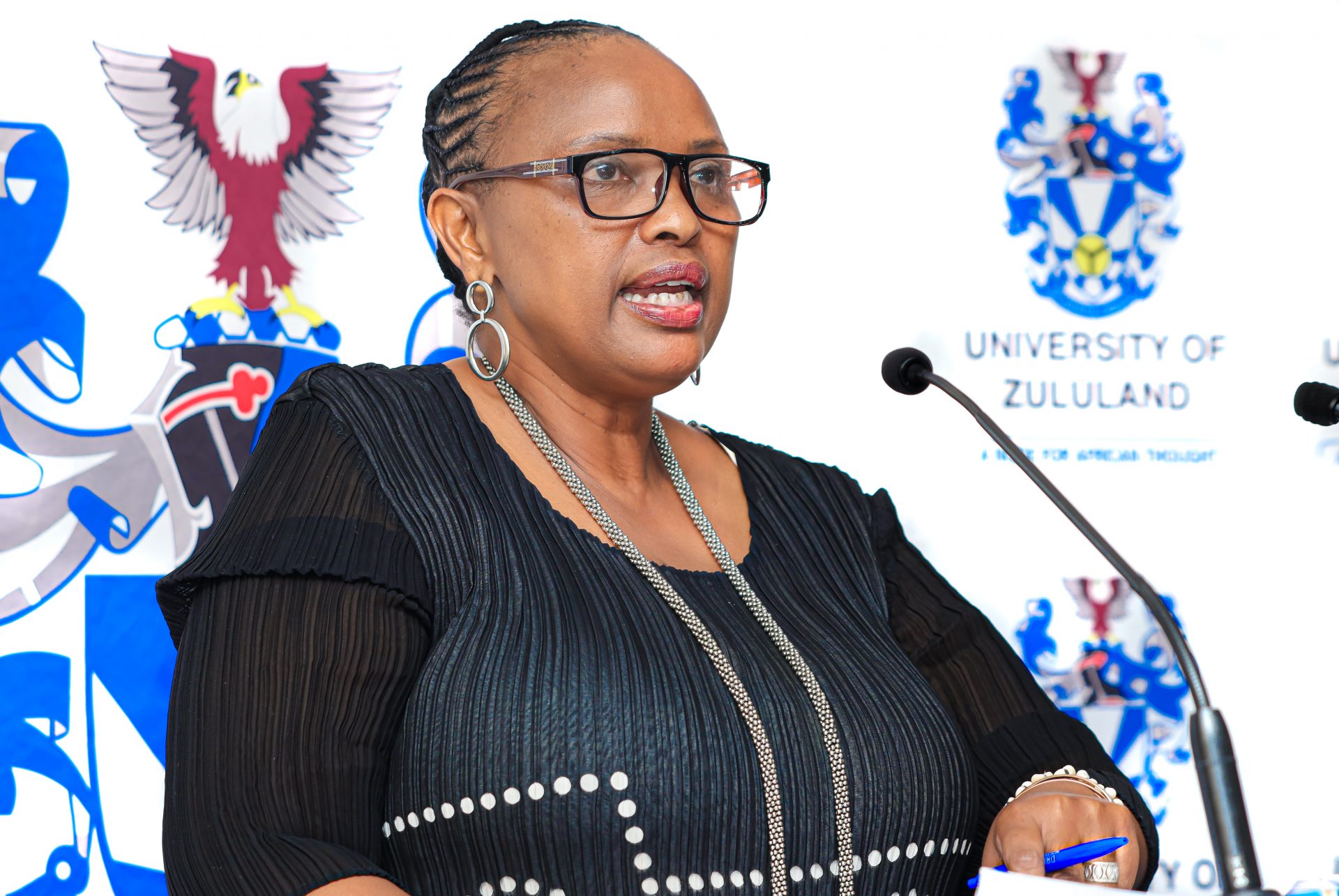Discussion During Workshop on A Node for African Thought Highlights Importance of Epistemic Freedom

The topics of insurgency pedagogy and re-membering elements of our identity that were dismembered through coloniality emerged as key take-homes during yesterday’s (Thursday, 7 March 2024) roundtable discussion of day two of the Workshop on A Node for African Thought.
The discussion was sparked by presentations delivered by Professor George Moyo, Director of the Richards Bay Campus, and Dr Smangele Cele, Head of the Department. Delving into the issue of decoloniality, both speakers raised varied, critical points as a means of mapping the way forward for the University of Zululand in its mission to establish itself as a node for African thought.
Prof Moyo first drew the audience’s attention to the colonial entanglements the University finds itself in. “When I say entanglement, it means all the areas and actions are influenced by things that are not even local. Pluto will influence what is happening here. Not even going too far to Pluto, the moon, the tides – everything. It’s a question of interconnectedness. The world is interconnected; we cannot escape that. So, all these issues of colonialities are an example of interconnectedness,” he explained.
The professor paid particular attention to the coloniality of power, stating that it is manifested through discursive practices and ideology – things that surround us in our everyday lives and which influence what we perceive as reality. He expounded that discourse does not only take place in the form of language, but it is a system of representation, as some scholars have argued. Mass media platforms such as Tik Tok and Facebook are some of the forms of discourse which further entrench the coloniality of power, Prof Moyo said.
He agreed with decoloniality scholar Professor Ndlovu-Gatsheni’s stance that the world needs to strive for epistemic freedom. Revisiting a point previously made by Professor Sipho Seepe in day one of the workshop, Prof Moyo underscored that universalisation of knowledge derived from the West worked against epistemic freedom because it meant that what is considered knowledge and truth can only be verified by the Western pool of scholars.
“That is how it works its way out to epistemological dimensions, further reinforcing the discourses that we have, and then shaping ontology and shaping being. All that converges. I will use another word: interceptionality. All those intercepts on a colonised being in the lived experiences,” the speaker said.
He was particularly glad that, given its colonial entanglements, UNIZULU’s Vision 2027 has begun the process of “unfreezing” among UNIZULU academics, thereby instituting change. To this end, he urged the attendees from the Faculty of Humanities and Social Sciences to develop a decolonial consciousness and start reading, with understanding, on concepts currently being researched by scholars around the issue of colonialities as this will enable change. He encouraged them to also interrogate two phenomena: epistemologically insurgent curriculum and pluriverse curriculum.
“We can have as many workshops like this, talking around issues, but unless we sit down and read and try to understand and implement and reconfigure our teaching, we are going nowhere. It’s time to get our hands dirty. It’s time for action.”
His hope was that in the next workshop, many academics would showcase what they would have done in terms of developing a pluriversal curriculum or an insurgent pedagogy. That, for him, is the way to move to develop the world of consciousness that we need.
In her presentation, Dr Cele concentrated on Prof Ndlovu-Gatsheni’s stance on how colonisation gave to the dismemberment of Africans. This dismemberment was not only in the form of geography and being but stretched all the way to indigenous knowledge systems and historical records.
She stressed that the workshop presents an opportunity of re-membering what was dislocated by coloniality.
“Colonisers have worked so hard, in the process of dismemberment, to disrupt the knowledge we had as African people in the African continent,” noted the scholar. “In the process of re-membering, what is it that we need to do as a university, as a faculty to put together, to reconfigure? The information that we have lost, knowledge that slipped through our finger – how do we bring it back? We collaborate through community engagement.”
Having proposed the solution to re-membering, Dr Cele proceeded to showcase how this process had already begun at UNIZULU in the form of a collaborative community engagement project in Nongoma between the departments of Sociology, African Languages, History and Social Work. This project is centered on raising a boy child.
Dr Cele shared that academics have physical interactions with the boys in question, their mothers, elders in the communities and community leaders. This was part of the process of re-membering, she highlighted.
The Workshop on A Node for African Thought is a series aimed at inculcating the UNIZULU mantra within its academic pool. The first workshop targeted scholars from the Humanities and Social Sciences. Similar workshops intended for other faculties will be in the coming months.
- Naledi Hlefane
Picture: Xolani Ncube













